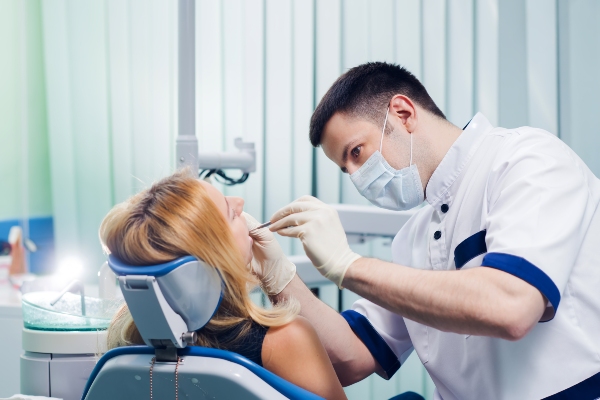 Clenching and grinding the teeth, also known as bruxism, can wear them down and cause jaw and ear pain. General dentists can help patients with bruxism avoid pain and discomfort. This blog will review the causes, symptoms, and treatments for teeth grinding.
Clenching and grinding the teeth, also known as bruxism, can wear them down and cause jaw and ear pain. General dentists can help patients with bruxism avoid pain and discomfort. This blog will review the causes, symptoms, and treatments for teeth grinding.
How a General Dentist Treats Bruxism
Understanding bruxism
It is common for people to be unaware they clench or grind their teeth until they notice the symptoms, such as a tender jaw, ear pain, facial pain, sensitive teeth, headaches, or chips and cracks in the teeth. The temporomandibular joint, or TMJ, may even pop or click while chewing. Bruxism can also damage the bone underneath the teeth. A general dentist may detect these harder-to-catch symptoms through inspection and dental X-rays during a routine oral exam.
According to Johns Hopkins Medicine, stress and anxiety are two of the most common causes of teeth grinding. Anger, frustration, and certain medications can also cause bruxism. Dental treatments for bruxism vary depending on the cause.
How to stop grinding teeth
Use a mouthguard
A general dentist will recommend a mouthguard for a patient who grinds their teeth at night. While mouthguards are available at the drugstore, generic mouthguards can cause problems due to improper fit. They can be too long, high, and thin, making them uncomfortable and prone to breaking.
A custom-made mouthguard does not have the issues presented by over-the-counter mouthguards. The general dentist will fit it into the patient’s mouth for optimal comfort. Custom mouthguards are also made of a more durable material, making them a good choice for athletes and those who grind their teeth intensely.
Get dental splints
If the jaw or teeth are slightly misaligned and causing bruxism, a general dentist may recommend a dental splint to reposition the problem areas. Grinding can be reduced through proper alignment. Similar to custom mouthguards, splints are tailor-made for each patient.
Consider muscle relaxers or other medication
Muscle relaxers can help relieve bruxism, especially when taken before bedtime for a case of sleep bruxism. However, this is not typically used as a long-term treatment; muscle relaxants relieve discomfort while the patient waits or gets used to a mouthguard or splint.
Other medications may also help. For example, if an anxiety disorder is the underlying cause of bruxism, a general dentist may recommend that the patient see a psychiatrist about going on medication. Finding the right antidepressant or anti-anxiety medication can help with the symptoms of bruxism and the underlying mental health condition.
Explore other treatments for bruxism
Sometimes, bruxism is caused by sleep apnea or another medical condition. A general dentist will refer the patient to the correct doctor or specialist in these cases. A mouthguard or splint may be safe to use depending on the condition; make sure to inform the dentist of any other medical conditions when discussing bruxism treatments.
Book an appointment with a general dentist
Teeth grinding can cause pain, discomfort, and oral health problems. There is relief. Call our dental office to learn more about the various treatments for bruxism.
Request an appointment or call Davis & Dingle Family Dentistry at 803-567-1804 for an appointment in our Columbia office.
Recent Posts
Halitosis treatment targets root causes, like gum disease or decay, to provide a path to fresher breath and a healthier smile. This approach addresses persistent bad breath at its source rather than simply masking odors. With the right treatment from a general dentist, patients can achieve lasting fresh breath and improved confidence in their daily…
Even if we do not like it, there is a reason our general dentist recommends routine visits at least every six months. In fact, there are several important reasons why we should get into the habit of going to the dentist for regular visits as often as is necessary or as is told. The visits…
Bad breath can feel uncomfortable and embarrassing, even more so when it does not seem to go away. If you are struggling with chronic bad breath, a general dentist can help. Many treatment options are available, some of which take place at home. In this article, we will explore the common causes of bad breath…


